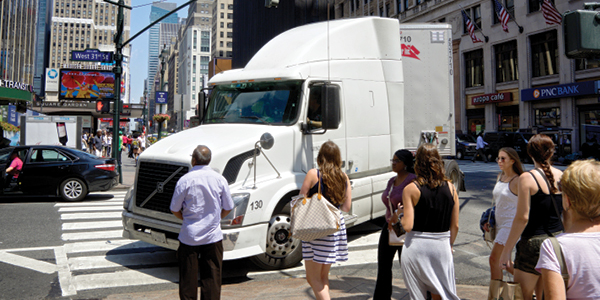Urban Logistics: You Can’t Fight City Haul

The impact of urbanization—population increases in cities and towns as opposed to rural areas—on business growth and sustainability concerns nearly all companies surveyed in The Road to Sustainable Urban Logistics, a new report by UPS and GreenBiz Group. However, only 47 percent feel prepared to address the associated business challenges, according to the survey.
Further, respondents cite air quality (58 percent) and traffic congestion (53 percent) as top concerns over other urban challenges. And 65 percent of respondents say insufficient collaboration across sectors, including government, is a key barrier to well-managed logistic operations in urban areas.
"Increased urbanization and congestion make logistics far less predictable and harder to manage," says Mark Wallace, UPS senior vice president, global engineering and sustainability. "Without implementing innovative solutions supported by technology and logistics ingenuity, we run the risk of increasing congestion and emissions. We need solutions, and collaboration is the key."
The movement of goods is an essential function supporting businesses and residents, and a fundamental source of economic growth in cities. Access to e-commerce is part of what makes alternative transport modes and walkable urbanism a viable choice. At the same time, transportation and delivery can contribute to pollution and gridlock, and can be challenging for companies to manage sustainably.
When asked how the rise in e-commerce, increased urbanization, and congestion have affected how they conduct business in urban areas, 81 percent of survey respondents note some form of impact on their business, such as the ability to meet e-commerce customer expectations (33 percent), make deliveries to retail locations (32 percent), and meet city requirements for emission levels (31 percent).
Continuing population growth and urbanization will add 2.5 billion people to the world’s urban population by 2050, according to UN projections. The UPS study offers insights on strategies and pilot projects being explored to better manage the movement of goods in cities, now and in the future.
The results point toward data-driven technologies that increase efficiencies and reduce traffic, renewable and alternative energy and fuels that help address air quality issues, the accurate measurement and management of carbon emissions, and supply chain optimization.
The real difference-maker, though, isn’t any single piece of technology. It’s the commitment to partner with cities, academics, and other business leaders to develop solutions together.
"Smart collaborations, continued research, and investments in infrastructure will remain critical to meet the logistical and environmental demands cities face," notes John Davies, GreenBiz Group’s vice president and senior analyst. "Driving policy discussions and decisions based on data is essential to ensuring operational efficiencies for companies and preserving a desirable quality of life for city dwellers."
The majority of survey respondents (63 percent) say businesses play a critical role in accelerating, piloting, and adopting innovative approaches to creating more sustainable urban environments. And an overwhelming 72 percent of respondents want to work closely with city officials to do so.
